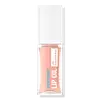What's inside
What's inside
 Key Ingredients
Key Ingredients

 Benefits
Benefits

 Ingredients Side-by-side
Ingredients Side-by-side

Polybutene
Diisostearyl Malate
EmollientTridecyl Trimellitate
EmollientHydrogenated Polyisobutene
EmollientOctyldodecanol
EmollientSilica Dimethyl Silylate
EmollientVp/Hexadecene Copolymer
Sorbitan Isostearate
EmulsifyingSimmondsia Chinensis Seed Oil
EmollientTocopheryl Acetate
AntioxidantHydrolyzed Hyaluronic Acid
HumectantDehydroacetic Acid
PreservativeVanillyl Butyl Ether
MaskingPolyglyceryl-2 Triisostearate
EmulsifyingPolyglyceryl-2 Diisostearate
EmulsifyingTitanium Dioxide
Cosmetic ColorantIron Oxides
CI 15850
Cosmetic ColorantPolybutene, Diisostearyl Malate, Tridecyl Trimellitate, Hydrogenated Polyisobutene, Octyldodecanol, Silica Dimethyl Silylate, Vp/Hexadecene Copolymer, Sorbitan Isostearate, Simmondsia Chinensis Seed Oil, Tocopheryl Acetate, Hydrolyzed Hyaluronic Acid, Dehydroacetic Acid, Vanillyl Butyl Ether, Polyglyceryl-2 Triisostearate, Polyglyceryl-2 Diisostearate, Titanium Dioxide, Iron Oxides, CI 15850
Triisostearoyl Polyglyceryl-3 Dimer Dilinoleate
EmollientPolybutene
Diisostearyl Malate
EmollientOctyldodecanol
EmollientPolyglyceryl-2 Triisostearate
EmulsifyingVp/Hexadecene Copolymer
Silica Dimethyl Silylate
EmollientAdansonia Digitata Seed Oil
EmollientCamellia Japonica Seed Oil
EmollientPassiflora Incarnata Seed Oil
Skin ProtectingPentaclethra Macroloba Seed Oil
EmollientTocopherol
AntioxidantHexadecene
SolventPentaerythrityl Tetra-Di-T-Butyl Hydroxyhydrocinnamate
AntioxidantAroma
CI 77891
Cosmetic ColorantIron Oxides
CI 42090
Cosmetic ColorantCI 15850
Cosmetic ColorantCI 45380
Cosmetic ColorantCI 45410
Cosmetic ColorantTriisostearoyl Polyglyceryl-3 Dimer Dilinoleate, Polybutene, Diisostearyl Malate, Octyldodecanol, Polyglyceryl-2 Triisostearate, Vp/Hexadecene Copolymer, Silica Dimethyl Silylate, Adansonia Digitata Seed Oil, Camellia Japonica Seed Oil, Passiflora Incarnata Seed Oil, Pentaclethra Macroloba Seed Oil, Tocopherol, Hexadecene, Pentaerythrityl Tetra-Di-T-Butyl Hydroxyhydrocinnamate, Aroma, CI 77891, Iron Oxides, CI 42090, CI 15850, CI 45380, CI 45410
 Reviews
Reviews

Ingredients Explained
These ingredients are found in both products.
Ingredients higher up in an ingredient list are typically present in a larger amount.
Ci 15850 is the pigment color red. It is an azo dye and created synthetically.
Azo dyes need to be thoroughly purified before use. This allows them to be more stable and longer-lasting.
This ingredient is common in foundations, lipsticks, and blushes. This color is described as brown/orangey red.
It has many secondary names such as Red 6 and Red 7. According to a manufacturer, Red 6 usually contains aluminum.
Learn more about CI 15850Diisostearyl Malate is an emollient and most often used in lip products. It comes from isostearyl alcohol, a fatty acid, and malic acid, an AHA.
As an emollient, Diisostearyl Malate helps create a thin film on your skin to trap moisture in. This helps keep your skin soft and smooth.
Octyldodecanol is a fatty alcohol. It is primarily used to enhance the texture of products.
As an emulsifier, Octyldodecanol helps prevent the oils and waters from separating. It also prevents ingredients from creating foam when shaken.
Octyldodecanol is created by reducing fatty acid to an alcohol.
Due to its high molecular weight, it does not get absorbed into the skin.
Learn more about OctyldodecanolPolybutene is used to help control the viscosity of a product. This just means it helps adjusts the texture.
It is a polymer and does not get absorbed into the skin due to its large size.
Studies found this ingredient did not irritate skin in concentrations below 15%.
Learn more about PolybuteneThis ingredient is a form of glycerin with emulsifying and emollient properties.
As an emulsifier, this ingredient helps keep products together while adding a thick texture. The manufacturer states this ingredient has emollient properties. Emollients help keep the skin hydrated by trapping moisture in.
Polyglyceryl-2 Triisostearate is created by reacting diglycerin and isostearic acid. Due to the isostearic acid base, it may not be safe for Malassezia or fungal acne.
Learn more about Polyglyceryl-2 TriisostearateThis silica is mainly used to thicken oils and suspend particles in oils. It is not water soluble.
According to the manufacturer, it:
The manufacturer also claims this ingredient to be useful in makeup.
In lipstick formulations, this ingredient improves color payoff, reduces pigment settling, and reduces oil bleeding. This ingredient also improves the grip of powder products such as dry shampoos.
Learn more about Silica Dimethyl SilylateVP/Hexadecene Copolymer is a synthetic film-forming agent. It has both water and oil loving properties, allowing it to create a flexible, even film on the skin.
This ingredient helps enhance texture, smoothness, and wear resistance in makeup products while reducing tackiness.
This ingredient is a combination of red, black, and yellow iron oxide pigments. This combination of colors is usually found in foundation, because it results in a "skin" color.